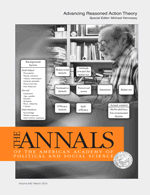Abstract:
In 2010, the city of Philadelphia launched a media campaign to reduce the consumption of sugar-sweetened beverages (SSBs) in homes with children as a strategy to combat obesity. Using the integrative model (IM) of behavioral change and prediction, a theory-based precampaign survey of Philadelphia parents was conducted to determine the most effective message content. Results indicated that intention to eliminate SSB consumption is attitudinally driven and suggested that effective messages should highlight feelings of nurturing and concern about child weight gain. Focus group testing led to the selection of a television ad, transit/print ad, and a radio spot that incorporated aspects of the theory-based results from the baseline survey. An online message testing experiment found that exposure to campaign messages increased intention to reduce SSBs and supported the underlying beliefs in the correct direction. These results illustrate how the IM can be applied to the development of a public health intervention.
Authors
- Amy Bleakley
- Amy Jordan
- Giridhar Mallya
- Jessica Taylor Piotrowski


